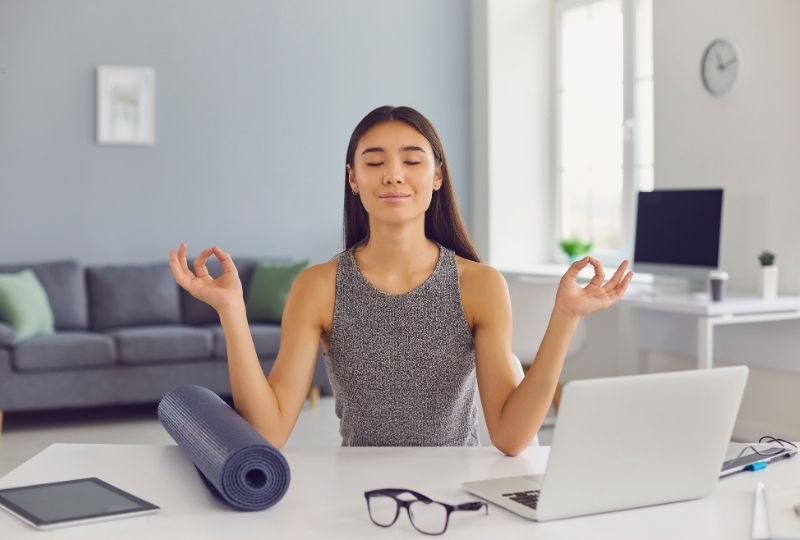Anxiety is a common experience in today’s fast-paced world, affecting millions of people worldwide. While occasional anxiety is normal, chronic anxiety can interfere with sleep, focus, and overall well-being.
Instead of relying solely on medication, there are natural and effective techniques that can help you calm your mind, relax your body, and regain control over your emotions.
In this guide, you’ll discover science-backed methods to reduce anxiety naturally and improve your mental health.
Understanding Anxiety: Why Does It Happen?
Anxiety is the body’s natural response to stress, triggering the fight-or-flight reaction. When anxiety becomes chronic, it can lead to:
🔹 Overthinking and excessive worrying
🔹 Muscle tension and headaches
🔹 Fatigue and trouble sleeping
🔹 Digestive issues (nausea, stomach discomfort)
🔹 Difficulty concentrating
By using natural techniques, you can manage anxiety without relying on medication.
10 Natural Ways to Reduce Anxiety
1. Practice Deep Breathing (The 4-7-8 Method)
Deep breathing activates the parasympathetic nervous system, which signals relaxation.
✅ Try This Exercise:
- Inhale deeply for 4 seconds.
- Hold the breath for 7 seconds.
- Exhale slowly for 8 seconds.
✅ Why It Works: Slows down the heart rate and reduces stress hormones (cortisol).
2. Get Moving with Physical Activity
Exercise naturally lowers anxiety by releasing endorphins, which improve mood.
✅ Best Activities for Anxiety Relief:
- Walking or jogging in nature 🏃♂️
- Yoga and stretching 🧘♀️
- Dancing or swimming 💃🏊♂️
✅ Why It Works: Movement reduces tension, improves circulation, and clears the mind.
3. Reduce Caffeine and Sugar Intake
Too much caffeine and sugar can trigger anxiety, heart palpitations, and mood swings.
✅ Better Alternatives:
- Swap coffee for herbal tea (chamomile, green tea, or peppermint).
- Choose dark chocolate instead of sugary snacks.
✅ Why It Works: Stabilizes energy levels and prevents anxiety spikes.
4. Use Mindfulness and Meditation
Mindfulness helps you stay in the present moment, reducing excessive worrying.
✅ How to Practice:
- Focus on your breath or surroundings.
- Use guided meditation apps (Headspace, Insight Timer).
- Practice body scan meditation to relax your muscles.
✅ Why It Works: Mindfulness re-trains the brain to focus on the present rather than anxious thoughts.
5. Get Enough Sleep
Lack of sleep worsens anxiety and increases stress hormones.
✅ Tips for Better Sleep:
- Stick to a consistent bedtime.
- Avoid screens 1 hour before bed.
- Try a relaxing bedtime routine (reading, meditation, or herbal tea).
✅ Why It Works: Sleep regulates emotions and helps the brain process stress.
6. Try Herbal Remedies and Supplements
Some herbs have natural calming effects on the nervous system.
✅ Best Herbal Options for Anxiety:
- Chamomile tea → Promotes relaxation.
- Lavender essential oil → Reduces stress and improves sleep.
- Magnesium supplements → Helps with muscle relaxation and mental calmness.
✅ Why It Works: These remedies help balance stress hormones naturally.
7. Spend Time in Nature (Grounding Technique)
Being in nature reduces cortisol levels and promotes relaxation.
✅ How to Practice Grounding:
- Walk barefoot on grass or sand.
- Sit by a river, beach, or under a tree.
- Spend 5–10 minutes in direct sunlight daily.
✅ Why It Works: Nature calms the nervous system and reduces mental fatigue.
8. Journal Your Thoughts
Writing helps organize thoughts and process emotions.
✅ Journaling Prompts for Anxiety Relief:
- What are 3 things I can control right now?
- What is one small action I can take to feel better?
- What am I grateful for today?
✅ Why It Works: Journaling reduces overthinking and helps you gain perspective.
9. Listen to Soothing Music or Sounds
Music has a direct impact on brain waves and emotions.
✅ Best Music for Relaxation:
- Instrumental music (piano, violin, guitar).
- Nature sounds (rain, ocean waves, birds).
- Binaural beats (calming frequencies for the brain).
✅ Why It Works: Certain sounds trigger relaxation responses in the brain.
10. Practice Progressive Muscle Relaxation (PMR)
This technique helps release physical tension caused by anxiety.
✅ How to Do It:
- Start with your toes—tense them for 5 seconds, then release.
- Move up to your legs, stomach, shoulders, and jaw.
- Repeat until your whole body feels relaxed.
✅ Why It Works: PMR reduces muscle tension and promotes deep relaxation.
Final Thoughts
Anxiety can feel overwhelming, but using natural techniques helps regain control over your mind and body.
Start by choosing one or two techniques and practice them daily. Over time, you’ll notice a significant reduction in stress and anxiety levels.
Remember: Small changes lead to big results!
